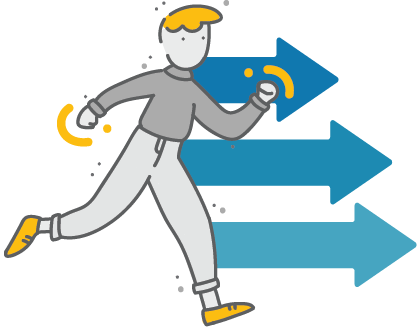Becoming a Self-Manager
What is an Action Plan?
Updated Aug 8, 2019
Swipe right to go to the next slide
An Action Plan is a very useful tool to support your recovery. It provides a structure for you to implement a self-management strategy (e.g. take frequent brain breaks) or take steps in returning to a meaningful activity (e.g. going hiking). Gradually getting more active is treatment, not just something to start after you are fully recovered.

Before we begin, download this blank Action Plan template [pdf] to follow along. Ready? Now let’s begin.
Throughout this guide, there are many examples of goal areas to choose from, such as better managing headaches; improving sleep; pacing; assertive communication; return to activities; stress management; and many more goal areas to choose from.
Now, identify an action you can take towards reaching that goal.
It’s important to use the SMART principles (Specific, Measurable, Achievable, Realistic, and Timely) when writing your action.
Instead of “exercise more,” a SMART action would be “use my stationary bike, for 15 minutes, on level 2, on Monday, Wednesday, and Friday.”
Deciding to do something won’t automatically lead to change unless you have a concrete plan. Again, think about Where, When, and How Often or How Much?
Think of any obstacles that might come up, and brainstorm strategies to overcome them.
How confident are you to complete this action on a scale of 0-10?
If your confidence is 7 or higher, you are ready to take action. If not, modify your Action Plan until you feel at least 7/10 confident.
Put your plan in action!
How did it go? Sometimes Action Plans don’t go perfectly the first time. Be kind to yourself. Behaviour change is hard. Make some changes, and try again.
Hopefully by now you have created an action plan of your own. Here is an example of a completed action plan [pdf].
After completing an Action Plan successfully, you could try moving onto a different goal. You can also make a new Action Plan based on the same goal and increase the frequency, duration, or intensity.
Your Action Plans will help you form good habits over time, allowing you to move closer to your larger goals, and increasing your independence and confidence.
Action Plans are so important and we will be referring to them a lot in MyGuide: Concussion. Consider taking the time now to practice making an Action Plan of your own in an area that is important to you.
You can download a blank template [pdf].

Click the button above to toggle between light mode and dark mode. This toggle can also be found in the menu.
Hold
and tap
to zoom in.
Hold
and tap
to zoom out.
Hold
and tap
to zoom in.
Hold
and tap
to zoom out.
On most mobile devices, you can spread to zoom.
Increase your text size in your device settings.
Remember to take regular breaks while exploring MyGuide: Concussion.
Vancouver Coastal Health’s MyGuide Concussion Team would love to hear your feedback! It matters to us and helps to improve the experience for future users. Your responses will be kept anonymous and your privacy is a top priority. To complete a 15-20 minute online survey or request a telephone survey, please click the link below.